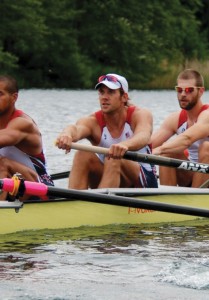
- Former Drexel rower Steve Kasprzyk, who graduated in 2005, was selected to compete on the United States men’s eight in the 2012 Olympics in London. The men fell just short of earning a medal by a painful three-tenths of a second.
The United States men’s eight rowing team traveled to England last week to compete in the 2012 Summer Olympic Games. Representing the U.S. as part of the squad was Drexel University’s own Stephen “Steve” Kasprzyk, a 2005 graduate and star on the Drexel rowing team.
The six-foot-seven-inch, 215-pound rower from Cinnaminson, N.J., began rowing for the Dragons as a freshman in 2000 and later led the team to the finals of the prestigious Dad Vail Regatta in 2002. Over the course of his career after college, Kasprzyk spent four years on the U.S. national team — 2007, 2009, 2011 and 2012 — with London as his first Olympic Games.
The U.S. men’s eight boat consisted of coxswain Zach Vlahos, stroke Grant James, David Banks, Kasprzyk, Jake Cornelius, Brett Newlin, Ross James, Will Miller and Giuseppe Lanzone. Mike Teti, a three-time Olympic rower and five-time Olympic rowing head coach, took the role as the U.S. men’s eight coach once again. As a rower, Teti won a bronze medal and placed fourth on the men’s eight boats at the Olympics in Seoul and Barcelona, respectively. As a coach he led the U.S. men’s eight to gold in 2004 in Athens and bronze in 2008 in Beijing. While the men’s eight team appeared to be on the decline in Beijing, it has since been revitalized this past year, consistently improving leading up to the London Olympics.
All of the rowing events at this year’s Olympics took place at Dorney Lake in Windsor. Dorney Lake, also known as Eton Dorney, is a relatively new 2,200-meter-long artificial lake that was completed in 2006.
The U.S. men’s eight opened up Olympic competition July 28 on the state-of-the-art course in the preliminary round. The preliminaries were broken down into two heats of four boats, with the winners of each heat advancing to Final A and the remaining six crews advancing to the repechage July 30 to determine heat placement for the finals. Each race is 2,000 meters long. Team USA won its preliminary heat with a time of 5:30.72, earning a spot in Final A. Germany won the other preliminary heat with a time of 5:25.52, claiming the other early berth into Final A.
Based on the results in the repechage, four additional teams joined Final A and two comprised Final B, with both finals taking place Aug. 1. The U.S. would face off against Germany, the U.K., the Netherlands, Australia and Canada, while Poland and Ukraine would race in the other heat. The Germans, unbeaten since 2009, entered the final as the clear favorites to win the gold.
The race began with the British immediately challenging the Germans. A crowd of over 25,000, which mainly consisted of Englishmen, cheered loudly as the boats passed the halfway point. The two teams battled fiercely for the first 1,500 meters of the race before the power and increased stroke rate of the German eight propelled them into the lead. Meanwhile, the Canadian eight made an impressive move in the last quarter of the race to overtake the U.K., but they were unable to catch the Germans, who won the race by half a length with a time of 5:48.75. This marks the first time the Germans have won this event at the Olympics since 1988. Canada crossed the line in 5:49.98. The U.S. started slow but furiously fought back and narrowly missed a bronze medal, finishing in 5:51.48, which was just three-tenths of a second behind the U.K. at 5:51.18.
Despite the crushing disappointment of missing a medal by such a small margin, the U.S. men’s eight should certainly be proud of their performance.

